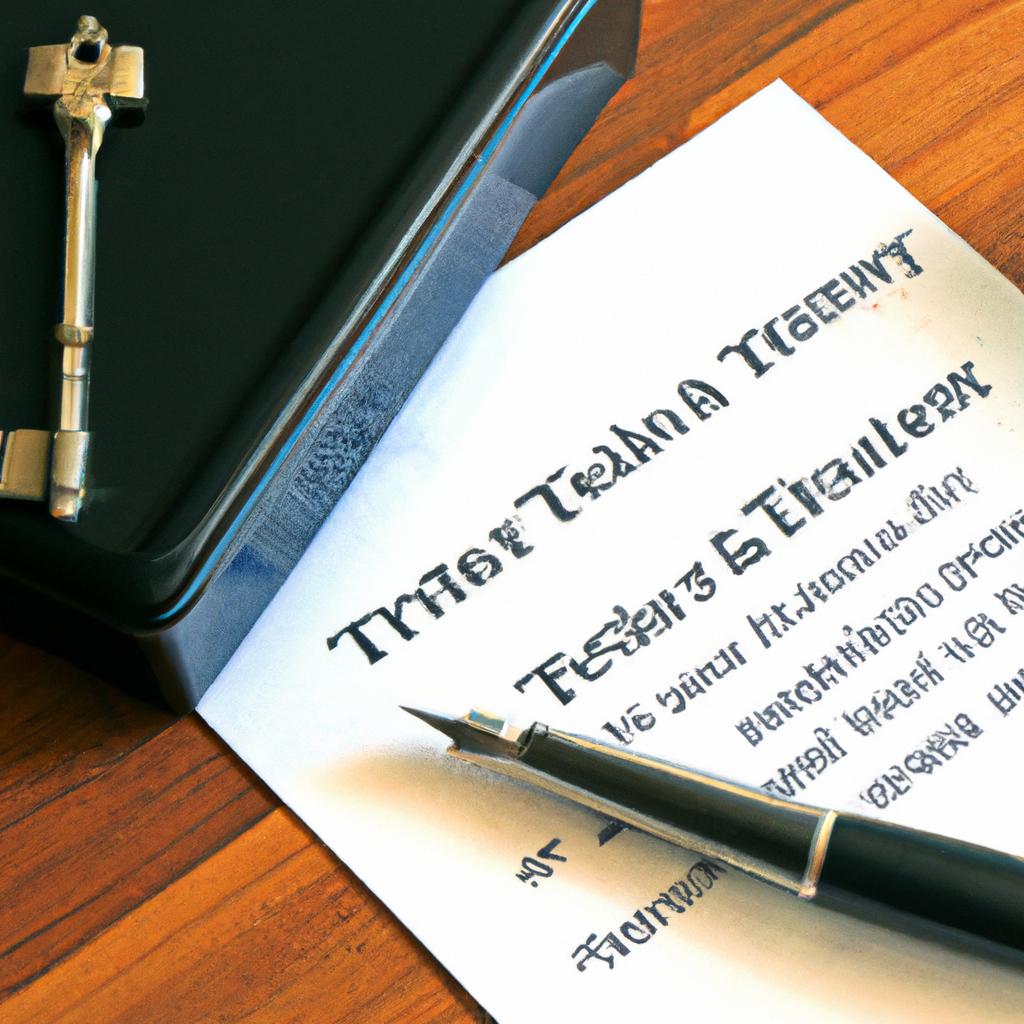In the complex realm of estate planning, the concept of “tod deed states” carries significant weight and implications for individuals seeking to protect and distribute their assets. As seasoned legal professionals at Morgan Legal Group, located in the heart of New York City, we strive to provide clarity and guidance on this intricate matter. In this article, we will delve into the fundamentals of tod deed states, shedding light on their importance and relevance in the realm of estate planning. Join us as we navigate the intricacies of this legal concept with precision and insight.
Understanding the Legal Implications of TOD Deed States
When it comes to estate planning, understanding the legal implications of Transfer on Death (TOD) Deed States is crucial. In these states, property owners can use a TOD deed to transfer real estate to designated beneficiaries upon their death, without the need for probate. This can be a valuable tool for streamlining the transfer of assets and avoiding the time and expense of probate court.
However, it’s important to be aware of the specific laws and regulations governing TOD deeds in each state. Some key points to consider include:
- The requirements for creating a valid TOD deed
- The process for revoking or changing a TOD deed
- The impact of TOD deeds on Medicaid eligibility

Navigating the Complexities of Property Transfer on Death Deeds
Transferring property through a Transfer on Death Deed (TOD deed) can be a valuable estate planning tool to avoid probate and simplify the transfer of property upon death. However, navigating the complexities of TOD deeds can be daunting for many individuals. Understanding the laws and requirements specific to TOD deed states is crucial to ensure a smooth and successful transfer of property.
In TOD deed states, such as New York, California, and Florida, property owners can execute a TOD deed to designate a beneficiary who will receive the property upon their death. It is important to carefully follow the state-specific guidelines for executing a TOD deed, as failure to do so can result in the deed being deemed invalid. Consulting with an experienced estate planning attorney can help ensure that all legal requirements are met and that your property is transferred according to your wishes.

Maximizing Benefits and Minimizing Risks with Transfer on Death Deeds
Transfer on Death Deeds, or TOD Deeds, can be a valuable tool in estate planning for individuals looking to maximize benefits and minimize risks. By designating beneficiaries to receive property upon the owner’s passing, TOD Deeds can help avoid probate and ensure a smooth transfer of assets. However, it is essential to understand the specific regulations and requirements of TOD Deeds in different states to fully utilize their advantages.
In TOD Deed states, such as New York, California, and Texas, individuals can take advantage of the benefits TOD Deeds offer, such as avoiding probate, maintaining privacy, and providing a simple transfer process for their beneficiaries. By consulting with an experienced estate planning attorney, individuals can ensure that their TOD Deed is valid and accurately reflects their wishes. It is crucial to stay informed about any changes in state laws regarding TOD Deeds to ensure that the transfer process remains smooth and efficient for all parties involved.
| Benefits of TOD Deeds | Risks of TOD Deeds |
|---|---|
| Avoids probate | Potential disputes among beneficiaries |
| Maintains privacy | Complex legal requirements |
| Simple transfer process | Unforeseen challenges in property ownership |

Key Considerations for Implementing a Transfer on Death Deed Strategy
When implementing a Transfer on Death Deed (TOD Deed) strategy, there are several key considerations that individuals should keep in mind to ensure a smooth and successful transfer of property upon their passing. One important aspect to consider is state-specific regulations and requirements regarding TOD Deeds. Different states have varying laws and procedures governing the use of TOD Deeds, so it is crucial to consult with a legal professional familiar with TOD Deed states to ensure compliance.
Additionally, individuals should carefully consider designating beneficiaries in their TOD Deed. It is essential to clearly identify who will receive the property upon the owner’s death and to ensure that the chosen beneficiaries are correctly listed in the TOD Deed. Moreover, individuals should regularly review and update their TOD Deed if there are any changes in their beneficiaries or if they acquire new assets that they wish to include in the TOD Deed.
Q&A
Q: What are “tod deed states”?
A: “Tod deed states” refer to states that allow for a Transfer on Death (TOD) deed to transfer real estate from the property owner to a designated beneficiary upon their death without the need for probate.
Q: What are the benefits of using a TOD deed in these states?
A: Using a TOD deed in these states can help property owners avoid the time and expense of probate, ensure a smoother transfer of property to heirs, and maintain privacy as the transfer does not become part of public record until the owner’s death.
Q: Which states currently allow TOD deeds?
A: As of 2021, 24 states and the District of Columbia have laws allowing TOD deeds, including states such as California, Texas, Florida, and Illinois.
Q: Are there any limitations or drawbacks to using a TOD deed?
A: While TOD deeds can be a convenient estate planning tool, they may not be suitable for every situation, as they do not account for potential changes in circumstances or the need to distribute assets in a different way. It is important to consult with a legal professional to determine if a TOD deed is the best option for your estate planning needs.
Q: How do I go about creating a TOD deed for my property?
A: The process for creating a TOD deed varies by state, but generally involves drafting a deed that includes the required language for a transfer on death, signing the deed in the presence of a notary, and recording the deed with the appropriate county or city office. It is recommended to seek assistance from a legal professional to ensure the deed is properly executed and meets all legal requirements.
In Summary
In conclusion, understanding the complexities of probate laws in “tod deed states” is essential for anyone looking to ensure their assets are distributed according to their wishes. By utilizing this unique estate planning tool, individuals can effectively streamline the transfer of real property to their chosen beneficiaries. As always, it is important to consult with a legal professional to navigate the intricacies of estate planning in “tod deed states” and ensure your wishes are carried out smoothly. Whether you’re a seasoned investor or a first-time homeowner, the “tod deed” offers a straightforward and efficient solution for passing on your real estate legacy.
 Title: Understanding Tod Deed States: What They Are and How They Work
Title: Understanding Tod Deed States: What They Are and How They Work
As you embark on your homeownership journey, you may have come across the term “tod deed states” and wondered what it means. This may sound like a legal jargon that only lawyers and real estate professionals would understand. However, it is important for homeowners and potential homeowners to have a basic understanding of what tod deed states are and how they work. This can potentially save you a lot of confusion and headaches in the long run. In this article, we will delve into the details of tod deed states, their benefits, and practical tips for dealing with them.
What are Tod Deed States?
Firstly, let’s define what a deed is. A deed is a legal document that transfers ownership of real estate property from one party to another. Now, a tod (transfer-on-death) deed, also known as a beneficiary deed or a life estate deed, is a legal document that allows an individual to transfer their property to a designated beneficiary after they pass away. Unlike a traditional will or trust, a tod deed does not go through the probate process. This means that the property can be transferred to the beneficiary without involving the court, making this process faster and more cost-effective.
Tod deed states have implemented laws that allow for the use of tod deeds. These states include Alaska, Arizona, California, Colorado, Hawaii, Illinois, Indiana, Kansas, Minnesota, Missouri, Montana, Nebraska, Nevada, New Mexico, North Dakota, Oklahoma, Oregon, South Dakota, Texas, Utah, Virginia, Washington, West Virginia, and Wisconsin. Some states have also passed legislation but have not yet implemented the use of tod deeds. It is important to note that each state may have different regulations regarding tod deeds, so it is best to do your research or consult a legal professional for specific information.
Benefits of Tod Deeds
There are several benefits to using tod deeds when it comes to transferring property after death. Here are some of the advantages of using tod deeds:
1. Avoidance of Probate: As mentioned earlier, tod deeds help avoid the probate process. This saves time and money for your beneficiaries, as they do not have to go through the court, pay probate fees, or hire an attorney.
2. Privacy: The probate process is a public record, which means that anyone can access it and see the details of your estate. Tod deeds allow for a more private transfer of property as they do not go through the probate process.
3. Flexibility: While a traditional will or trust can be revoked or amended at any time, a tod deed can be changed or canceled at any time before the property owner’s death. This flexibility gives the property owner more control over their assets.
4. No Income Tax Consequences for Beneficiaries: When a beneficiary receives property through a tod deed, it does not count as income, and therefore, there are no income tax consequences. This can save your loved ones from potentially significant tax burdens.
How Do Tod Deeds Work?
Now that we have covered the basics let’s talk about how tod deeds work. It is important to note that the process and regulations may vary slightly depending on the state, but the general steps are as follows:
1. Create a Legal Tod Deed Document: The first step is to create a tod deed document that meets the requirements of your state. Some states provide specific forms that can be used, while in others, you may need to create your own or consult a legal professional.
2. Sign the Tod Deed in the Presence of a Notary Public: Both the property owner and the designated beneficiary must sign the tod deed in the presence of a notary public to make it legally binding.
3. Record the Tod Deed: In most states, the document must be filed with the county recorder’s office where the property is located. This ensures that the transfer of property is recorded and becomes a matter of public record.
4. Just in Case: While tod deeds can be a great estate planning tool, it is always a good idea to have a backup plan. Unexpected situations can arise, and having a traditional will or trust in place can help ensure that your wishes are carried out.
Tips for Dealing with Tod Deeds
– Choose a reliable and trustworthy executor or beneficiary who can handle the responsibility of managing the property after your passing.
– Keep your beneficiary informed about the details of your property to avoid any confusion or misunderstandings.
– Update your tod deed if your circumstances change, such as getting married, having children, or acquiring new properties.
Case Study: The Importance of Tod Deeds
Let’s take a look at a real-life case that highlights the importance of tod deeds. A couple, David and Rachel, bought a beautiful vacation home in Arizona, which they intended to pass down to their children after they passed away. However, they did not make any estate planning preparations, and David unexpectedly passed away. Without a tod deed in place, the property went through the probate process, costing the family time, money, and stress. Thankfully, Rachel later created a tod deed, which allowed the property to be transferred directly to her children after her passing, avoiding any further probate issues.
In Conclusion
Tod deed states offer a useful estate planning tool for homeowners looking to ensure an efficient transfer of their property after their passing. They provide benefits such as avoiding probate, privacy, flexibility, and tax savings. However, it is essential to understand the laws and regulations specific to your state and seek legal advice if needed. With proper preparation and knowledge, tod deeds can be an effective way to transfer property and secure your family’s future.

